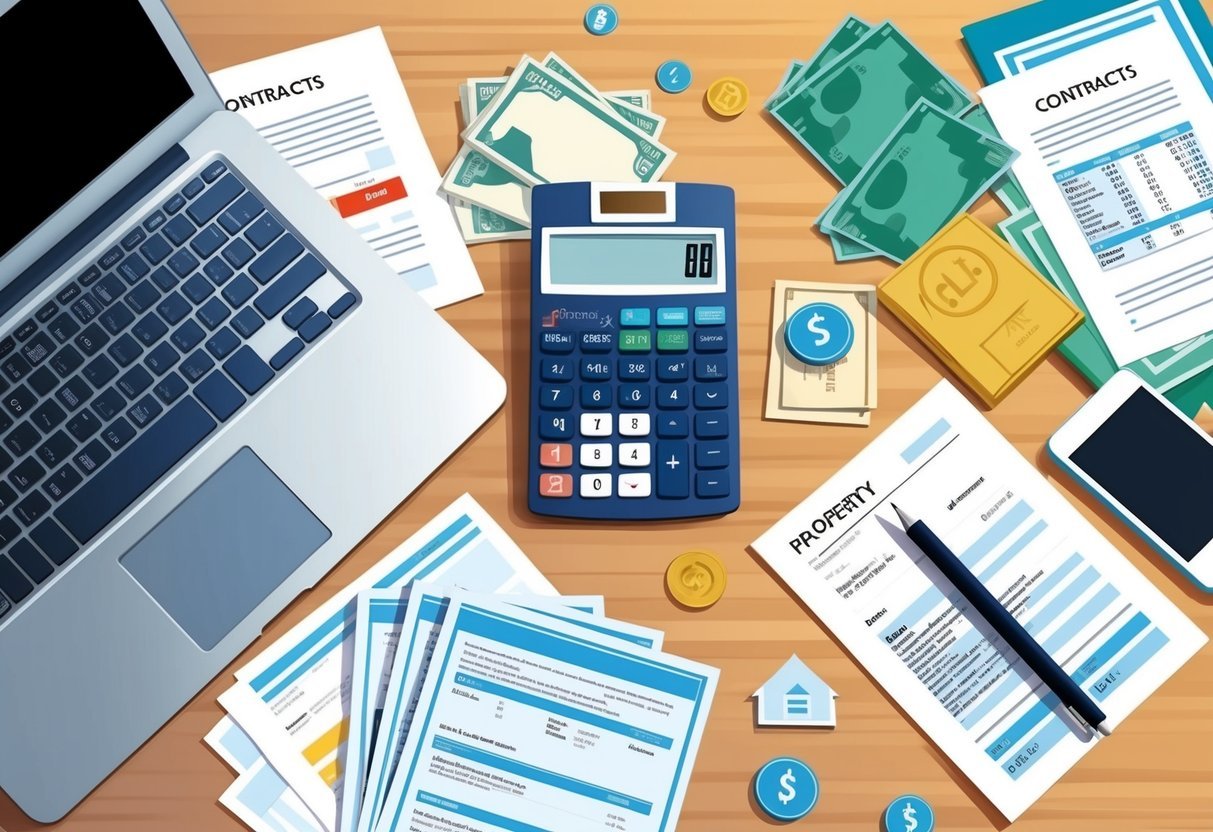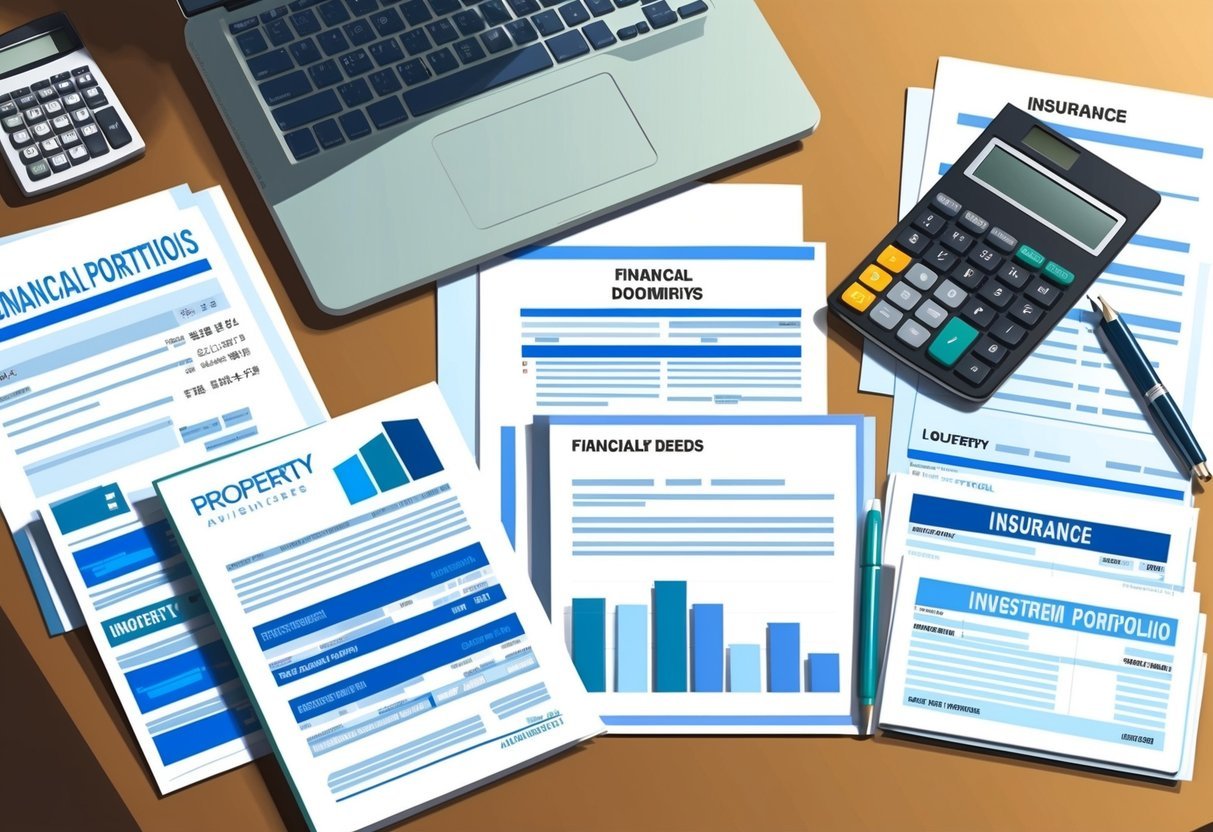Navigating the world of real estate investment requires a sound strategy and an awareness of the legal and financial frameworks that underpin successful ventures.
As we immerse ourselves in the intricacies of property transactions, we see the importance of acquiring and maintaining critical documentation.
These documents serve as the backbone of our investment journey, guiding us through acquisition, management, and potential divestment.

Understanding these key documents empowers us as real estate investors to make informed decisions, mitigate risks, and comply with legal requirements.
Each document plays a unique role in safeguarding our interests and ensuring smooth transactions in an ever-changing market landscape.
1) Property Deed
In our experience as real estate investors, we find that a property deed is one of the most fundamental documents we need.
It’s the legal instrument that officially transfers ownership of real estate from a seller to a buyer.
A property deed not only provides proof of ownership, but also specifies any conditions attached to the property.
There are several types of property deeds, each serving different purposes.
The general warranty deed offers the highest level of protection to the buyer.
It assures that the property is free from liens or encumbrances and provides a guarantee against any future claims.
On the other hand, a special warranty deed only provides guarantees for the time period that the seller owned the property.
This means any issues that arise from previous ownership periods won’t be covered.
We might also encounter a quitclaim deed.
This type of deed offers the least protection, conveying only the interest the grantor has, without any warranties.
It’s often used when there is no need for a comprehensive guarantee, such as between family members.
Understanding the nuances of each type of deed is crucial for us when buying or selling properties.
The choice of deed affects the level of legal protection and determines our level of risk.
Knowing this helps us make informed decisions, ensuring our real estate transactions are secure and beneficial.
2) Title Insurance Policy
As real estate investors, securing our investments is a priority.
Title insurance plays a vital role in this.
It shields us from financial setbacks by covering potential issues with property ownership that may arise after we complete a purchase.
A thorough title search might miss some risks, but a title insurance policy offers protection from these hidden threats.
These can include unresolved liens or claims against the property that surface unexpectedly.
Such issues can lead to legal battles or financial loss.
The cost of legal defense in disputes over ownership rights can be substantial.
Title insurance covers these expenses, helping us maintain our investment without additional financial strain.
This coverage serves as a safety net, ensuring that our property rights remain secure.
It’s important to understand that title insurance differs from hazard or homeowner’s insurance.
While those policies protect against property damage, title insurance specifically addresses ownership disputes and related legal challenges.
In our real estate endeavors, having a clear property title is crucial.
By investing in a title insurance policy, we mitigate risks, allowing us to focus on growing our real estate portfolio without constant worry about unexpected claims.
3) Operating Agreement

When investing in real estate through a limited liability company (LLC), having a robust operating agreement in place is crucial.
This document outlines the operational and financial structure of the LLC, ensuring that each member’s roles and responsibilities are clearly defined.
Operating agreements serve as a safeguard by detailing how the business will be run and how decisions will be made.
We often see that such agreements define the distribution of profits and losses, making it clear how financial matters are managed.
They also address what percentage of the company each member owns, which helps prevent disputes.
Our experience tells us that operating agreements protect individual members from personal liability.
If someone sues the LLC, the agreement can shield members’ personal assets.
This legal protection is one reason we highly recommend having a well-drafted document.
Another essential aspect covered is the process for handling disputes or unexpected events, like a member wanting to leave the LLC.
Such clauses allow us to navigate challenges smoothly.
The operating agreement may also specify how new members can join the LLC and under what circumstances existing members can exit.
By anticipating these scenarios, we ensure the continuity of our investment operations.
In an industry full of uncertainties, an operating agreement provides stability.
It spells out not just the day-to-day functions but also the company’s mission and long-term vision.
Clear rules and expectations keep us aligned in our real estate ventures.
4) Lease Agreement

A lease agreement is one of the cornerstone documents in real estate investment.
It clearly defines the relationship between the landlord and tenant, outlining the terms and conditions that govern their interaction.
This document is legally binding, providing a framework for the rental process and safeguarding the interests of both parties involved.
When drafting a lease agreement, we must ensure it contains detailed information about the property.
This includes the address, description, and any rules or restrictions associated with its use.
By specifying these details, we reduce the likelihood of misunderstandings and ensure both parties have a clear expectation regarding the property’s upkeep and use.
The terms regarding rent are crucial components.
The agreement should specify the rent amount, due date, and accepted payment methods.
We must also include information about late fees and the consequences of missed payments.
These details create a predictable financial environment and protect our investment by establishing clear economic expectations.
Security deposits are another vital part of the lease agreement.
We need to outline the amount required and the conditions under which it may be withheld.
This provides us with a financial buffer against potential damages and offers tenants a clear understanding of their obligations when vacating the property.
It’s essential to address the lease duration within the agreement.
Whether it’s a fixed term or a month-to-month arrangement, having this defined prevents confusion.
This clarity ensures both landlords and tenants know the timeframe of their commitment and any procedures related to renewal or termination.
Including a section for maintenance and repairs specifies who is responsible for various upkeep tasks, mitigating potential conflicts.
Clear delineation of responsibilities helps maintain the property’s condition and fosters a harmonious landlord-tenant relationship.
5) Financial Statements

As real estate investors, financial statements are crucial tools for monitoring and evaluating our investments.
They offer a comprehensive view of our financial position, enabling us to make informed decisions.
The balance sheet provides insights into what we own and owe at any given time.
This document helps us assess the health of our investments by highlighting assets, liabilities, and equity.
The income statement, often referred to as a profit and loss statement, shows our earnings and expenditures over a specified period.
It provides a clear picture of our cash flow, helping us track profitability.
Another essential document is the cash flow statement.
This statement reveals the flow of cash into and out of our business, detailing how our operations, investments, and financing activities affect liquidity.
Understanding these statements allows us to identify opportunities for optimizing our tax strategy.
By analyzing them, we can pinpoint areas where deductions can reduce taxable income, ultimately enhancing profitability.
Regular review of these documents is necessary to maintain a strong portfolio.
Financial statements are indispensable for assessing risks and guiding our investment decisions.
They are fundamental to sound real estate management.
6) Due Diligence Checklist

In real estate, ensuring thorough due diligence is indispensable for making informed decisions.
Our checklist aims to guide investors through this crucial process.
We begin with property inspection, assessing structural integrity, systems, and potential repairs.
This step can prevent unforeseen expenses and ensure the property’s condition aligns with our expectations.
Next, reviewing the financials is a priority.
We delve into historical income and expense records, scrutinizing cash flow statements.
This helps us evaluate the property’s financial health and make informed projections.
Legal and environmental investigations are equally important.
We must verify the property’s title, zoning compliance, and any liens or encumbrances.
Environmental assessments help identify any contamination risks or required remediation efforts.
These legal and environmental factors can significantly impact a property’s value and future usability.
We utilize modern software tools for real-time data sharing and progress tracking.
This keeps our team aligned and informed, minimizing errors or miscommunications.
In today’s fast-paced market, having up-to-date information is critical to our success.
Through this step-by-step approach, we can mitigate risks and uncover opportunities.
This checklist serves as a practical guide in our real estate investment journey, ensuring we are fully informed and prepared before making any commitments.
7) Proof of Funds

When investing in real estate, establishing financial credibility is crucial.
A proof of funds (POF) letter serves as our assurance to sellers and financial institutions.
This document confirms we have the liquid cash needed to complete a property purchase.
It often becomes the foundation of a trustworthy relationship with sellers, providing them confidence in our financial stability.
These letters are vital when we aim to submit offers on properties.
They highlight our ability to cover a down payment, closing costs, or even purchase a property outright if required.
By presenting a proof of funds, we demonstrate our readiness to close a deal, which can be an advantage in competitive real estate markets.
Obtaining a proof of funds letter is a straightforward process.
We can acquire this document from our bank or financial institution, ensuring it reflects accurate account balances.
Sometimes, it might be necessary to consolidate funds into a single account, simplifying verification and reinforcing our financial capability in negotiations.
Providing a proof of funds letter not only accelerates transaction processes but also bolsters our negotiating position.
Sellers often prioritize offers backed by solid, transparent proof of financial capacity.
This document essentially reassures all parties involved, expediting deal closures and fostering smoother transactions.
By having a proof of funds letter on hand, we equip ourselves with a powerful tool, shaping both our investment strategy and our relationships with sellers.
It stands as a testament to our commitment to serious, well-backed investments.
Legal Considerations

In the realm of real estate investing, understanding legal aspects is essential.
We must address both the laws governing real estate and the property rights and obligations to protect and enhance our investments.
Understanding Real Estate Law
Real estate law forms the backbone of property investment, dictating how we buy, sell, and manage properties.
This involves knowing zoning laws, contract requirements, and tenant laws.
Staying informed on these elements helps us avoid legal pitfalls and ensures our transactions comply with state and federal regulations.
It’s also crucial to collaborate with legal professionals who can guide us through complex legal scenarios.
Their expertise aids us in interpreting contracts and navigating any disputes that may arise.
By doing so, we safeguard our interests and promote successful investments.
Property Rights and Obligations
Property rights define our ownership entitlements, such as the right to use, lease, or sell.
We must recognize these rights to manage properties effectively and avoid conflicts.
Additionally, understanding our obligations to maintain properties and honor tenant rights is vital for responsible ownership.
Legal documentation, such as deeds and titles, verifies our rights and obligations.
Any discrepancies in these documents can lead to disputes or financial loss.
Therefore, ensuring accuracy and clarity in all real estate documents is paramount.
Engaging with title companies or legal advisors can help us verify documentation and uphold our property rights comprehensively.
Risk Management

Effective risk management is critical for real estate investors.
It not only aids in identifying potential risks that could affect investments but also involves strategies to mitigate the impact of these risks.
Assessing Investment Risks
In our experience, comprehensive risk assessment begins with identifying potential threats that could impact a property’s performance.
Market dynamics, regulatory changes, and property-specific factors are common sources of risk.
We conduct market analysis and evaluate specific property conditions to spot these issues early.
By understanding local trends, we can anticipate fluctuations in demand that might affect asset value.
Another important element is verifying financial documents, ensuring that reported income and expenses are accurate.
Any outstanding debts or liens need attention.
Inaccurate financial data can conceal potential liabilities, so thorough due diligence is crucial before the purchase.
Mitigating Liabilities
Mitigation of potential liabilities involves implementing strategies that safeguard our investments.
Properly reviewing legal documents with the help of lawyers, including purchase agreements and leases, is a key step.
Ensuring that contractual obligations sufficiently protect our rights is essential to avoiding future legal complications.
Additionally, partnering with an experienced insurance advisor helps in selecting adequate coverage, protecting against unforeseen incidents, and minimizing loss impact.
Regular property inspections and maintenance address structural vulnerabilities, reducing the risk of unexpected repairs.
These proactive measures ensure increased security and protection against liabilities for our real estate ventures.
Financial Planning

In the world of real estate investing, having a solid financial plan is crucial.
We will explore how proper budgeting helps manage costs and secure profitability, while obtaining the right financing can affect investment opportunities and returns.
Budgeting for Real Estate Investments
Budgeting plays a key role in ensuring our real estate investments are financially viable.
We must include all potential income and expenses, such as rental income, mortgage payments, property taxes, and maintenance costs.
This comprehensive view allows us to forecast cash flow accurately.
We should also set aside cash reserves for unexpected expenses like repairs or tenant turnover.
By regularly updating our budget, we can locate inefficient spending and improve our investment strategies.
Keep track of financial metrics, such as net operating income (NOI) and return on investment (ROI), to evaluate the property’s financial health.
Securing Financing
Securing adequate financing is essential for expanding our real estate portfolio.
We need to evaluate the various financing options available, such as traditional bank loans, hard money loans, or private lenders.
Each option has its own terms and interest rates that impact the viability of our investments.
It’s important to understand our credit score and debt-to-income ratio before applying for a loan, as these factors influence loan approval and interest rates.
By negotiating favorable loan terms, we can achieve lower costs and enhance profitability.
This strategic approach to securing financing allows us to optimize cash flow and manage risk effectively.
Frequently Asked Questions
In real estate investing, understanding the legal and financial frameworks is crucial.
We often come across questions about the must-have documents and important factors to consider.
This guide aims to address some common inquiries investors may have.
What are the key components to include in a real estate purchase agreement?
A real estate purchase agreement should clearly outline the purchase price, property details, contingencies, and closing date.
It’s important to ensure that any conditions for the sale are explicitly stated, providing clarity for both buyer and seller regarding their obligations.
Which legal document should a buyer receive to be aware of any past issues with a property?
The title insurance policy is crucial for buyers.
It provides insight into past issues such as liens, disputes, or encumbrances, and protects against future claims that may cause financial loss.
This document ensures peace of mind when acquiring new property.
Can you list the common clauses to be found in a real estate contract?
Real estate contracts usually contain clauses related to financing, inspection contingencies, disclosures, and warranties.
These clauses are designed to protect both parties by specifying conditions under which the contract may be terminated or renegotiated.
What are the two main documents involved in real estate financing?
The primary documents are the mortgage deed and the promissory note.
The mortgage deed secures the lender’s interest in the property, while the promissory note outlines the loan terms and repayment schedule.
Together, they form the backbone of property financing.
What factors are crucial to evaluate before making a real estate investment?
Before investing, evaluate the property’s location, market trends, potential income generation, and associated costs.
Proper assessment of these factors helps mitigate risks and aids in making informed decisions that align with our investment goals.
How do various types of real estate contracts differ and what are their specific purposes?
Different real estate contracts serve unique purposes.
For example, lease agreements are used for rental terms, while operating agreements are for managing investment properties.
Each type specifies terms relevant to their context, ensuring clarity and alignment of expectations between involved parties.

